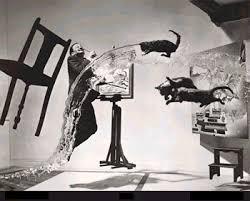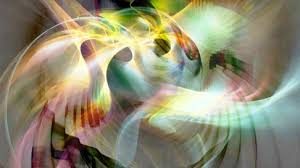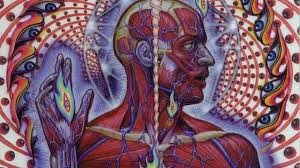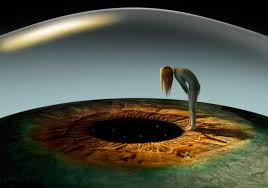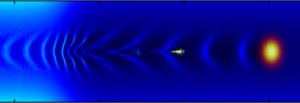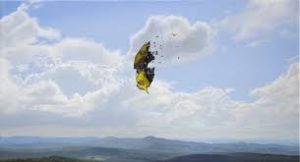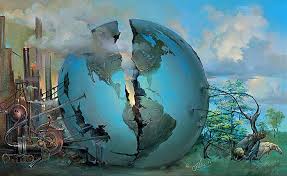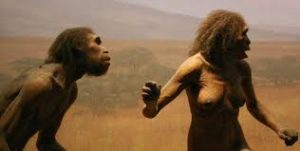Any real discussion of genetic heritage must all bring up questions involving free will and determinism, and to some extent those issues must also lead to questions concerning the nature of the reasoning mind itself.

Reasoning, as we are familiar with it, is the result of mental or psychic processes functioning in a space-time context, and in a particular fashion. To some extent, then, reasoning — again, as we are familiar with it — is the result of a lack of available knowledge. We try to “reason things out,” because the answer is not in front of us. If it were, we would “know,” and hence have no need to question.
The reasoning mind is a uniquely human and physical phenomenon. It depends upon conscious thinking, problem-solving methods, and it is a natural human blossoming, a spectacular mental development in its own framework of activity.

Our technology is one of the results of that reasoning mind. That “reasoning” is necessary, however, because of the lack of a larger, immediate field of knowledge. Thoughts are mental activity, scaled to time and space terms so that they are like mental edifices built to certain dimensions only. Our thoughts make us human.
Other creatures have their own kinds of mental activity, however. They also have different kinds of immediate perceptions of reality. All species are united by their participation in emotional states, however. It is not just that all species of life have feeling, but that all participate in dimensions of emotional reality. It has been said that only men and women have a moral sense, that only men and women have free will — if indeed free will is possible at all. The word “moral” has endless connotations, of course. Yet animals have their own “morality,” their own codes of honor, their own impeccable senses of balance with all other creatures. They have loving emotional relationships, complicated societies, and in a certain sense at least — an important one — they also have their arts and sciences. But those “arts and sciences” are not based upon reasoning, as we understand it.

Animals also possess independent volition, and while I am emphasizing animals here, the same applies to any creature, large or small: insect, bird, fish, or worm; to plant life; to cells, atoms, or electrons. They possess free will in relationship to the conditions of their existence.
The conditions of existence are largely determined by genetic structure. Free will must then of course function in accordance with genetic integrity. Genetic structure makes possible physical organisms through which life is to be experienced, and to a large extent that structure must determine the kind of action possible in the world, and the way or ways in which volition can be effectively expressed.

The beaver is not free to make a spider web. In human beings the genetic structure largely determines physical characteristics such as height, color of eyes, color of hair, color of skin — and, of course, more importantly, the number of fingers and toes, and the other specific physical attributes alone, a man or woman cannot use his or her free will to fly like a bird, or to perform physical acts for which the human body is not equipped.
The body is equipped to perform far better, in a variety of ways, than we give it credit for, however — but the fact remains that the genetic structure focuses volition. The genetic apparatus and the chromosomal messages actually contain far more information than is ever used. that genetic information can, for example, be put together in an infinite number of ways. The species cares for itself in the event of any possible circumstance, so that the genetic messages also carry an endless number of triggers that will change genetic combinations if this becomes necessary.

Beyond that, however, genetic messages are coded in such a way that there is a constant give-and-take between those messages and the present experience of any given individual. That is, no genetic event is inevitable.
Now besides this physical genetic structure, there is an inner bank of psychic information that in our terms would contain the “past” history — the reincarnational history — of the individual. This provides an overall reservoir of psychic characteristics, leanings, abilities, knowledge, that is as much a part of the individual’s heritage as the genetic structure is a part of the physical heritage.

A person of great intelligence may be born from a family of idiots, for example, because of that reincarnational structure. Musical ability may thus appear complete, with great technical facility, regardless of family background, genetically speaking, and again, the reincarnational bank of characteristics accounts for such events. That inner reincarnational psychic structure is also responsible for triggering certain genetic messages while ignoring others, of for triggering certain combinations of genetic messages. In actuality, of course — say that I smile — all time is simultaneous, and so all reincarnational lives occur at once.
Perhaps an analogy will help. An actor throwing himself or herself into a role, even momentarily lost in the part, is still alive and functioning as himself or herself in a context that is larger than the play. The character in the play is seemingly alive ( creatively) for the play’s duration, perception being limited to that framework, yet to play that role the actor or actress draws upon the experience of his or her own life. he or she brings to bear his or her own understanding, compassion, artistry, and is he is a good actor, or if she is, then when the play is over the actor is a better person for having played the role.

Now in the greater framework of reincarnational existences we choose our roles, or our lives, but the lines that we speak, the situations that we meet, are not predetermined. “You” live or exist in a larger framework of activity even while we live our life, and there is a rambunctious interplay between the yous in time and the you outside of time.
The you inside of time adopts a reasoning mind. It is a kind of creative psychological face that we use for the purposes of our life’s drama. This psychological face of our analogy has certain formal, ceremonial features, so that we mentally and psychologically tend to perceive only those data that are available within the play’s formal structure. We cannot see into the future, for example, or into the past.

We reason out our position. Otherwise our free will would have no meaning in a physical framework, for the number of choices available would be so multitudinous that we could not make up our mind to act within time: With all the opportunities of creativity, and with our own greater knowledge instantly available, we could be swamped by so many stimuli that we literally could not physically respond, and so our particular kinds of civilization and science and art could not have been accomplished — and regardless of their flaws they are magnificent accomplishments, unique products of the reasoning mind.
Without the reasoning mind the artist would have no need to paint, for the immediacy of his or her mental vision would be so instant and blinding, so mentally accomplished, that there would be no need to try any physical rendition of it. So nowhere do I ever mean to demean the qualities or excellence of the reasoning mind as we understand it.

We have, however, become so specialized in its use, so prejudiced in its favor, that our tendency is to examine all other kinds of consciousness using the reasoning mind as the only yardstick by which to judge intelligent life. We are surrounded everywhere by other kinds of consciousness whose validity we have largely ignored, whose psychic brotherhood we have dismissed — kinds of consciousness in the animal kingdom particularly, that deal with a different kind of knowing, but who share with us the reality of keen emotional experience, and who are innately aware of biological and psychic values, but in ways that have escaped our prejudiced examination.
To some extent that emotional reality is also expressed at other levels — as our own is — in periods of dreaming, in which animals, like men, participate in a vast cooperative venture that helps to form the psychological atmosphere in which our lives must first of all exist.

All creatures of whatever degree have their own appreciation of esthetics. many such creatures merge their arts so perfectly into their lives that it is impossible to separate the two: the spider’s web, for example, or the beaver’s dam — and there are endless other examples. This is not “blind instinctive behavior’ at all, but the result of well-ordered spontaneous artistry.
Art is not a specifically human endeavor, though man and woman likes to believe that this is so. Art is above all a natural characteristic. I try to straddle our definitions — but flowers, for example, in a fashion see themselves as their own artistic creations. They have an esthetic appreciation of their own colors. But nature seeks to outdo itself in terms that are most basically artistic, even while those terms may also include quite utilitarian purposes. The natural man and woman, then, are a natural artist. In a sense, painting is man’s and woman’s natural attempt to create an original but coherent, mental yet physical interpretation of his or her own reality — and by extension to create a new version of reality for his or her species.

We are still learning. Our work is still developing. How truly unfortunate we would be if that were not the case. There is always a kind of artistic dissatisfaction that any true artist feels with work that is completed, for he or she are always aware of the tug and pull, and the tension, between the sensed ideal and its manifestation. In a certain fashion the artist is looking for a creative solution to a sensed but never clearly stated problem or challenge, and it is an adventure that is literally unending. It must be one that has no clearly stated destination, in usual terms. In the most basic of ways, the artist cannot say where he or she is going, for is he or she knows ahead of time he or she is not creating but copying.
The true artist is involved with the inner workings of himself or herself with the universe — a choice, I remind you, that he or she has made, and so often the artist does indeed forsake the recognized roads of recognition. And more, seeing that, he or she often does not know how to assess his or her progress, since his or her journey has no recognizable creative destination. By its nature art basically is meant to put each artist of whatever kind into harmony with the universe, for the artist draws upon the same creative energy from which birth emerges.

Free will is the philosophical doctrine that the individual has the freedom to choose, without coercion, some actions consistent with his or her particular morals and ideals. Determinism is the opposing doctrine that everything, even the individual’s course of action, is determined by conditions outside one’s will.
Through the centuries philosophical and religious thinkers have created numerous complicated variations of ideas involving free will and determinism, so that neither thesis is as simple as it first appears to be. Man and woman related the concept of free will long age to the question of whether he or she could deliberately choose evil, for example. He or she still does. And he or she still struggles with questions about his or her freedom before God’s omnipotence and foreknowledge, and whether those qualities cause events, or can cause them, and whether they involve predestination. Opposing determinism is the idea that man or woman has always fought for his or her personal responsibility — that instead of being controlled entirely by his or her heritage, he’s or she’s capable of forming new synthesis of thought and action based upon the complicated patterns of his or her own history.

In a strange way, determinism has always seemed lacking as a concept — for if it means what it’s supposed to mean, then surely human beings setup the parameters within which determinism is said to operate. I see this as a contradiction of the notion that the individual is entirely at the mercy of his or her history and of nature. How can we be if through the ages we’ve created that history and nature against which we react? In other words, on joint and individual scales, vast though they may be, we do create our joint and individual realities.

Even in modern terms, our psychological and medical knowledge of mind and brian have added more complications to the doctrine of free will, yet it survives and grows. I feel strong connections involving free will, determinism, and probable realities — connections largely unexpressed and unexplored in our world’s societies.





















